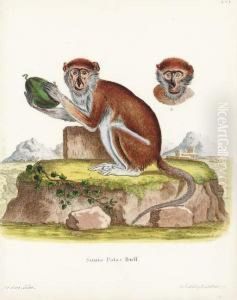Johann Christian Daniel Von Schreber Paintings
Johann Christian Daniel von Schreber was a German naturalist and physician who gained prominence for his contributions to the field of zoology, particularly mammalogy, during the 18th century. Born on January 17, 1739, in Weißensee, Thuringia, which was then part of the Holy Roman Empire, Schreber grew up in a time of great scientific exploration and discovery.
Schreber initially studied medicine and later became a professor of materia medica at the University of Erlangen. His interest in natural history, especially in the classification and description of animals, led him to become one of the most prolific naturalists of his time. Schreber's work was influenced by the system of nomenclature developed by Carl Linnaeus, the Swedish botanist and zoologist who is known as the 'father of modern taxonomy'.
Perhaps Schreber's most significant contribution to science was his continuation and expansion of Linnaeus's work on the classification of mammals. He is best known for his publication 'Die Säugethiere in Abbildungen nach der Natur mit Beschreibungen' (The Mammals in Illustrations according to Nature with Descriptions), which spanned multiple volumes and was published over many years, starting in 1774. This extensive work provided detailed descriptions and illustrations of mammals, many of which had not been previously described. Schreber's meticulous approach to the study of mammals helped lay the groundwork for future zoological research.
Beyond his work on mammals, Schreber also made contributions to entomology and botany, though these were not as extensive or influential as his mammalian studies. His legacy includes the many species he described, some of which bear his name as a testament to his impact on the field of zoology.
Johann Christian Daniel von Schreber passed away on December 10, 1810, in Erlangen, Bavaria. His legacy lived on through his writings and the specimens he collected, which continued to be valuable references for zoologists and naturalists in the centuries that followed. Schreber's dedication to the natural sciences during the Age of Enlightenment contributed significantly to the knowledge and understanding of the animal kingdom.
